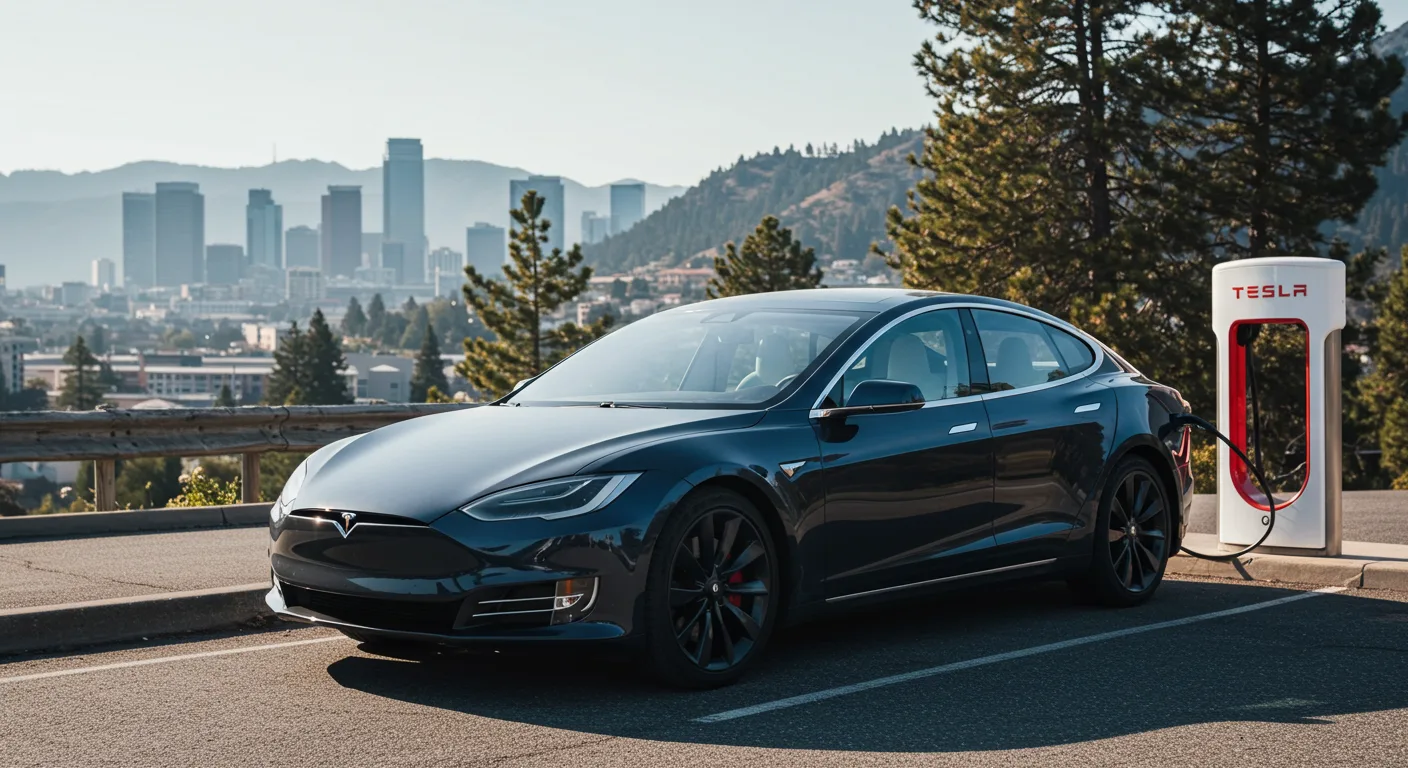1. Save Big on Fuel Costs by Driving an Electric Vehicle
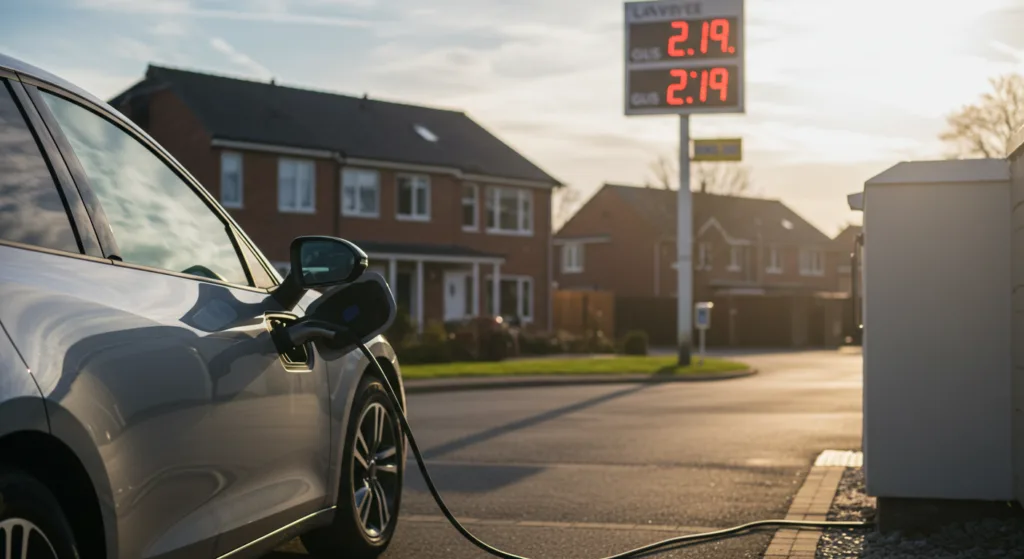
Fuel is one of the biggest recurring expenses for vehicle owners — and electric vehicles (EVs) completely change that game. By switching to an EV, you’re essentially replacing expensive gasoline or diesel with electricity, which is far cheaper per mile.
Here’s a real-world comparison:
- Average cost to drive a gas-powered car: $0.14–$0.20 per mile
- Average cost to drive an electric car: $0.04–$0.06 per mile
According to the U.S. Department of Energy, EV owners can save up to $1,000 per year on fuel alone. In Europe, where fuel prices are even higher, savings can exceed €1,200 annually, depending on usage and energy rates.
🔋 Additional ways EVs help you save on fuel:
- Night-time charging: Many utility companies offer cheaper rates during off-peak hours.
- Regenerative braking: EVs recharge the battery slightly every time you brake, reducing total energy consumption.
- Solar charging at home: If you install solar panels, you can charge your EV almost for free.
Whether you’re commuting daily or making long-distance trips, these savings add up — and fast. Plus, fuel price volatility won’t affect you anymore.
2. Enjoy Lower Maintenance Costs with Fewer Engine Parts
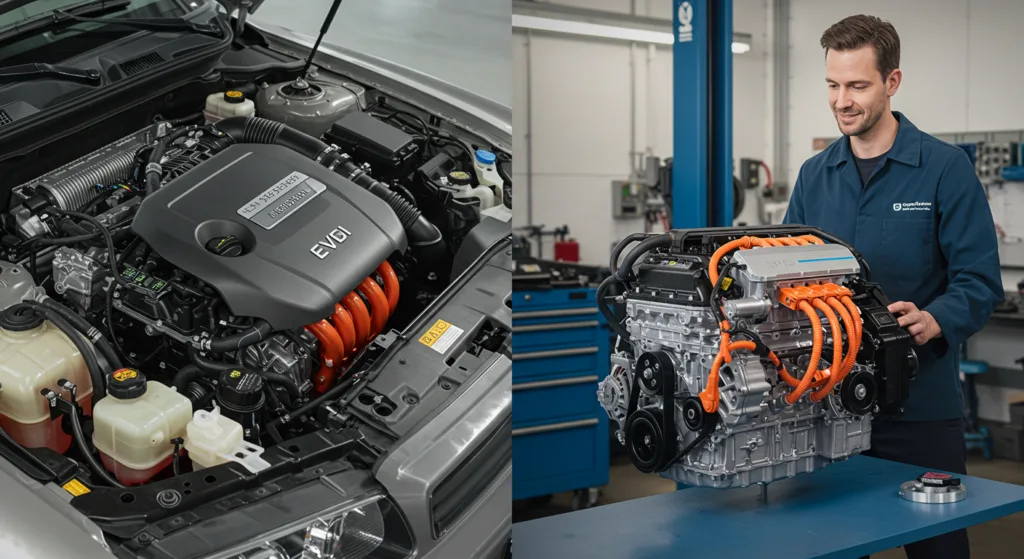
Traditional vehicles have hundreds of moving parts, many of which require regular maintenance. Electric cars? Not so much.
Here’s a quick comparison:
| Component | Gasoline Car | Electric Car |
|---|---|---|
| Oil changes | Every 5,000–10,000 km | ❌ Not needed |
| Transmission repairs | Common | ❌ No multi-speed transmission |
| Spark plugs & timing belts | Required | ❌ Not present |
| Brake wear | Faster | ✅ Reduced (regenerative braking) |
According to Consumer Reports, EV owners spend 50% less on maintenance and repairs over the lifetime of their car compared to internal combustion engine (ICE) vehicle owners.
💡 Common maintenance tasks for EVs:
- Tire rotations
- Cabin air filter replacement
- Battery coolant (every few years)
- Occasional software updates (often free and automatic)
Most EV manufacturers also offer long battery warranties, often 8 years or 100,000 miles, giving peace of mind about the biggest component in the vehicle.
3. Help the Planet with Zero Tailpipe Emissions

The transportation sector is responsible for about 29% of total greenhouse gas emissions in the U.S., according to the Environmental Protection Agency (EPA). In Europe, road transport accounts for nearly one-fifth of CO₂ emissions.
Electric vehicles produce zero tailpipe emissions, meaning:
- No carbon dioxide (CO₂)
- No nitrogen oxides (NOx)
- No particulate matter (PM2.5)
That’s a massive impact on urban air quality, especially in cities suffering from smog and pollution-related health issues.
🌍 Real environmental benefits of EVs:
- One EV can save 1.5 million grams of CO₂ annually — equivalent to planting 60 trees.
- Replacing just 20% of conventional cars with EVs can reduce total vehicle-related CO₂ emissions by up to 15% in a city.
- In countries like Norway, where most electricity is from renewable sources, EVs are essentially 100% clean transportation.
And even if your country’s grid still relies on fossil fuels, studies have shown that EVs still emit 30% to 60% less CO₂ over their lifetime compared to gas-powered vehicles, when accounting for electricity generation.
By driving electric, you’re not just saving money — you’re actively contributing to a healthier, more sustainable planet.
4. Get Tax Credits and Government Incentives for Going Electric
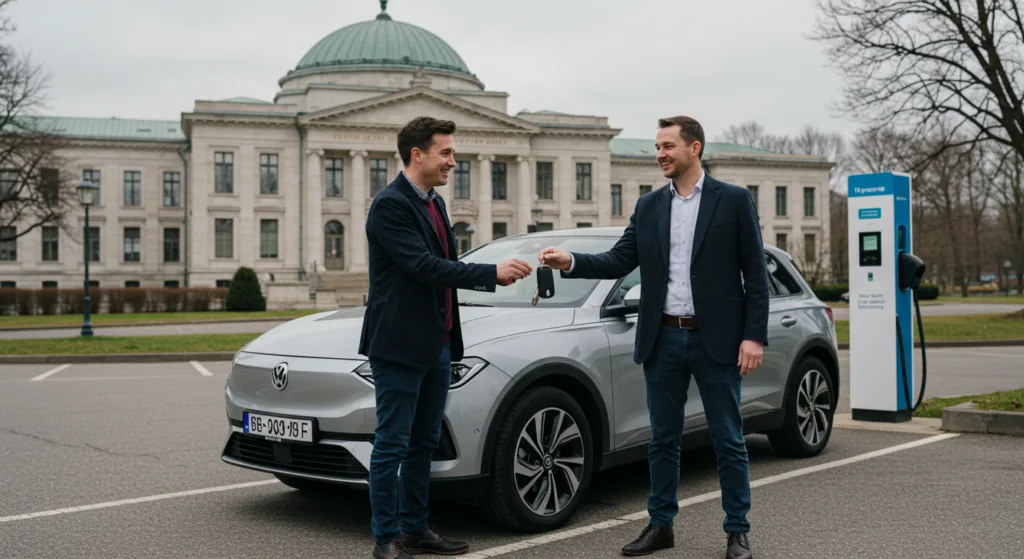
One of the most compelling reasons to switch to an electric car is the financial support available from governments worldwide. These incentives are designed to make EVs more affordable and accelerate the shift to green mobility.
🔎 What types of incentives are available?
- Federal tax credits (U.S.): Up to $7,500 for eligible electric vehicles.
- Local/state-level bonuses: Some U.S. states like California offer up to $2,000 extra in rebates.
- Europe-wide support:
- France: Up to €7,000 bonus écologique.
- Germany: Up to €6,750 through the Umweltbonus and innovation premium.
- UK: Reduced Benefit-in-Kind (BiK) tax for EVs used as company cars (as low as 2%).
- Free or discounted tolls, parking, and access to HOV lanes in many urban areas.
💰 Example savings scenario:
If you buy an EV priced at €35,000 in France and qualify for the full €7,000 bonus, your effective cost becomes €28,000 — cheaper than many ICE vehicles in the same category.
These incentives can significantly reduce your total cost of ownership (TCO) and make your transition to electric far more financially viable.
✅ Bonus tip: Many countries also offer grants for home charging station installations or discounted rates from energy providers for EV owners.
5. Experience Smoother and Quieter Rides with Electric Motors

Once you drive an electric vehicle, the difference is immediate — no engine rumble, no gear shifting, no lag. EVs offer a driving experience that is not just cleaner but smoother, quieter, and more responsive.
🚘 Why EV rides feel better:
- Instant torque: EVs deliver full torque from 0 RPM, giving you fast acceleration without delay.
- No gear shifts: Electric motors don’t need multi-speed transmissions, so you get seamless power delivery.
- Ultra-quiet operation: EVs produce almost no noise at low speeds, and even at highway speeds they’re significantly quieter than combustion engines.
- Low center of gravity: With heavy batteries located at the base, EVs handle curves and turns more smoothly.
📊 Consumer satisfaction: In recent JD Power and Consumer Reports surveys, EV owners consistently rated their driving experience higher than gas car owners, especially in categories like ride quality, handling, and responsiveness.
Whether you’re cruising in a city or gliding down a mountain road, the electric experience makes every trip feel like a luxury ride.
6. Say Goodbye to Gas Stations and Charge at Home
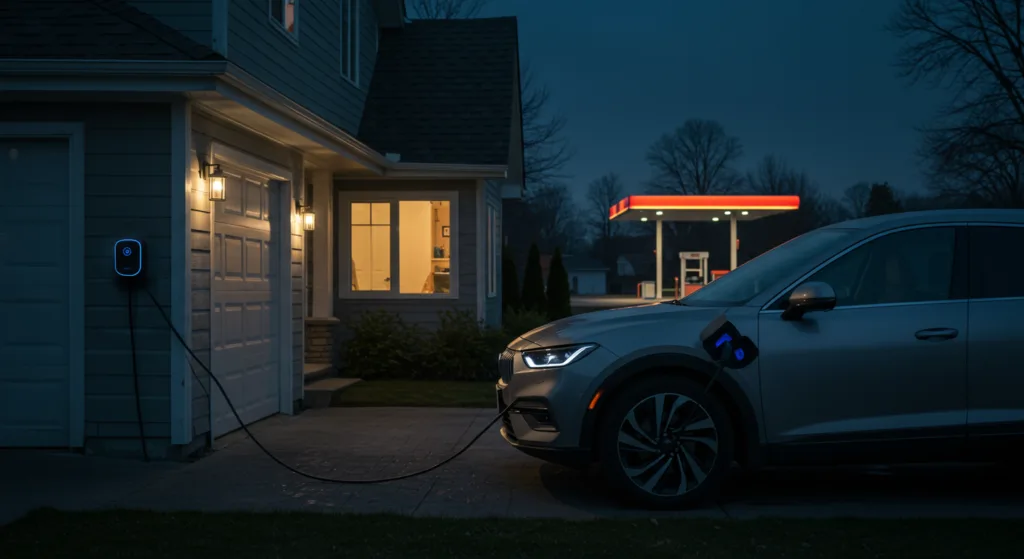
One of the most underrated benefits of owning an EV is the convenience of charging at home, which means no more waiting in line or planning detours to refuel.
🏠 Home charging = total control:
- Overnight charging: Plug in at night, wake up to a full battery every morning.
- Lower costs: Night-time off-peak electricity rates can reduce charging costs dramatically.
- Smart chargers: Schedule charging, monitor energy usage, and even power your home with vehicle-to-grid (V2G) technology (available in some models).
Here’s how long it typically takes to charge:
- Level 1 (standard plug): Adds ~5–8 km (3–5 miles) per hour.
- Level 2 (240V home charger): Adds ~30–50 km (20–30 miles) per hour.
- DC Fast Charger (public): 80% charge in 30 minutes (great for road trips).
⚡ Bonus benefits:
- No more standing in rain or cold to refuel
- Charge during your Netflix binge, dinner, or sleep
- Add solar panels to make charging nearly free
Charging at home turns your car into a smart appliance — one that’s always ready to go, without ever visiting a gas station again.
7. Access Growing Public Charging Infrastructure Nationwide
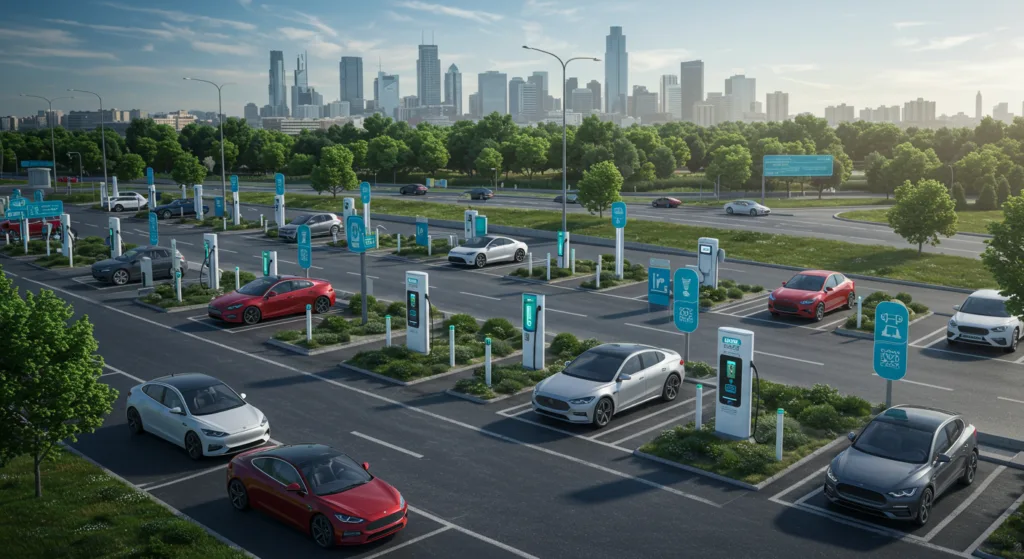
One of the common concerns for first-time EV buyers is “range anxiety” — the fear of running out of battery before finding a charger. Fortunately, public charging infrastructure is expanding rapidly and intelligently, making it easier than ever to power up on the go.
📈 Fast-growing networks worldwide:
- Europe: Over 600,000 public EV chargers as of 2024, with a target of 1 million by 2025 (EU Commission).
- U.S.: More than 160,000 public charging ports, including 36,000+ fast chargers — with federal investment targeting 500,000 chargers by 2030.
- China: Leading globally with over 2.2 million public EV chargers.
⚡ Types of chargers available:
- Level 2 (AC): Ideal for shopping centers, workplaces, and parking lots.
- DC Fast Chargers: Recharges your EV to 80% in just 20–30 minutes.
- Ultra-fast (350 kW): Available on highways via networks like IONITY, Electrify America, or Tesla Superchargers.
🗺️ EV-friendly tools:
- Apps like PlugShare, A Better Routeplanner, or ChargePoint help plan trips and locate compatible chargers.
- Real-time availability and payment via smartphone make charging smooth and modern.
Whether you’re commuting locally or heading on a cross-country trip, EV infrastructure is no longer a limitation — it’s a growing strength.
8. Join the Green Mobility Movement for a Sustainable Future
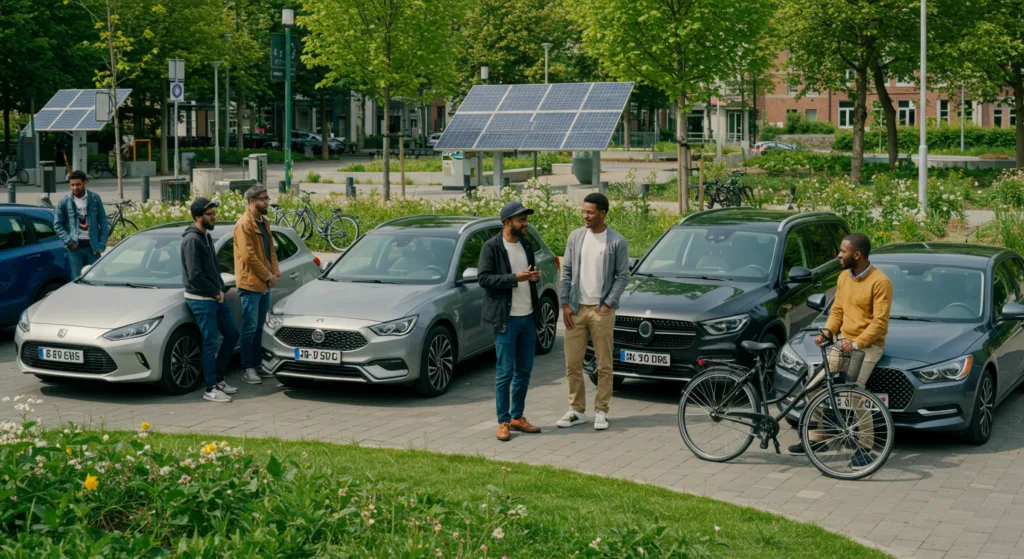
Driving an electric vehicle is more than a lifestyle choice — it’s a statement that you’re part of the solution. The global transition to green mobility is not just about cars but about reimagining how we move, live, and interact with our environment.
🌍 Why EVs matter for the planet:
- Reducing CO₂ emissions from road transport is critical to limit global warming to below 1.5°C (IPCC report).
- Transportation electrification can lower urban air pollution, decreasing cases of asthma, respiratory illness, and early death.
- EVs enable a shift toward renewable-powered mobility, especially when combined with solar or wind energy at home.
📣 Be part of a growing community:
- Cities like Amsterdam, Oslo, and San Francisco are prioritizing EVs with clean-air zones and green transport policies.
- Global brands and employers now offer incentives for employees driving electric, or have fleet electrification goals.
By choosing electric, you’re aligning yourself with a sustainable, forward-thinking movement that includes governments, businesses, and millions of drivers like you.
9. Increase Your Car’s Resale Value as EV Demand Grows
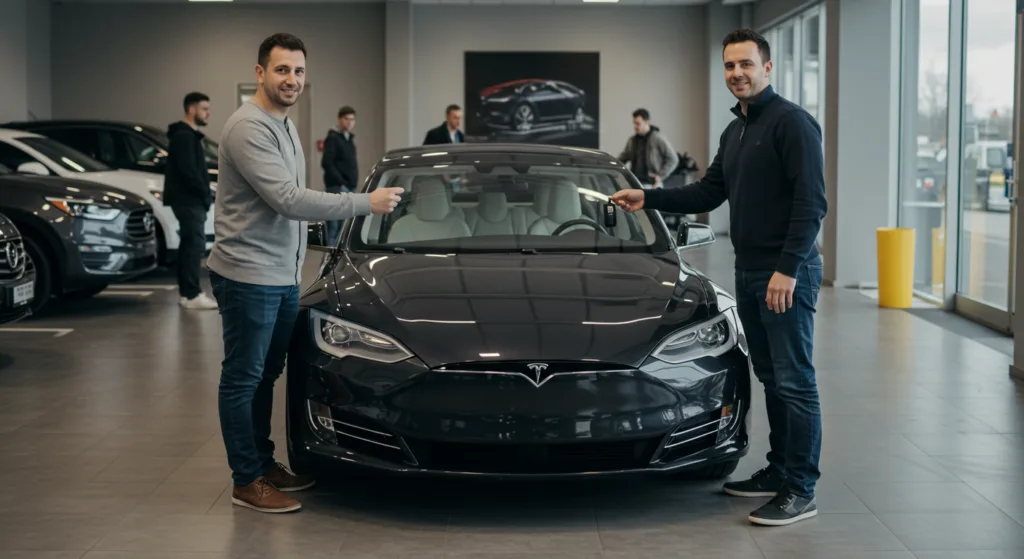
EV resale value is often overlooked — but it’s becoming a major advantage. As public awareness grows and governments announce ICE bans, the secondhand market for electric vehicles is heating up.
🔥 Current trends driving EV resale value:
- Demand for used EVs has risen by >35% year-over-year in several markets (Autotrader, 2024).
- Countries like the UK and France are banning new petrol/diesel cars by 2035, pushing more buyers toward EVs.
- EVs with good battery health and software updates hold value better than expected, especially brands like Tesla, Kia, Hyundai, and BMW.
📈 What affects EV resale price:
- Battery longevity: Most EVs maintain 70–90% battery capacity after 8–10 years.
- Software updates: OTA (over-the-air) updates keep the car current without dealer visits.
- Warranties: Battery warranties (often 8 years or more) boost buyer confidence.
The resale market is evolving — and owning an EV today puts you ahead of a future where electric is the new standard.
10. Drive the Latest Tech with Smart Features and Connectivity
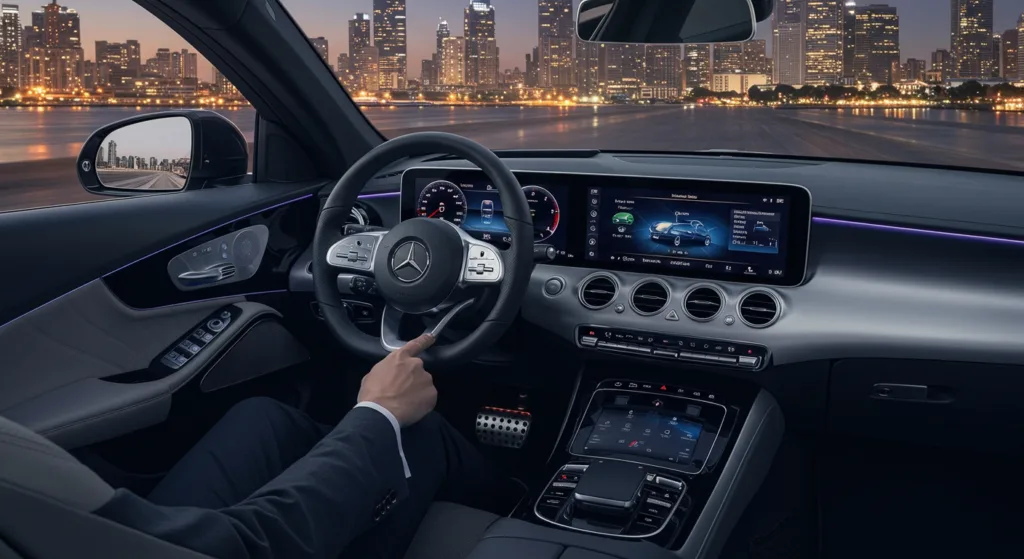
Electric vehicles are at the forefront of automotive innovation, often featuring the latest technology years ahead of traditional cars.
🚗 Tech advantages of EVs:
- Smart infotainment systems with AI voice assistants, real-time traffic, and OTA updates.
- Autonomous driving features: Many EVs offer Level 2 or even Level 3 driver assistance (lane-keeping, autopilot, self-parking).
- Vehicle-to-Grid (V2G) and bi-directional charging let your car power your home during outages.
- Mobile app integration: Lock/unlock, pre-condition cabin, schedule charging, and locate your car — all from your phone.
🔧 Built-in features include:
- Adaptive cruise control
- 360° cameras
- Regenerative braking customization
- Integrated route planning with charger stops
- Voice-controlled cabin settings
Owning an EV isn’t just eco-friendly — it’s a leap into the future of mobility, where your car becomes an extension of your smart life.
Switching to an electric car is no longer just a trend — it’s a smart, sustainable move that benefits your wallet, the planet, and your everyday driving experience. With lower fuel and maintenance costs, exciting tax incentives, and cutting-edge technology, there’s never been a better time to go electric.
🚗 Ready to join the electric revolution?
If you found this article helpful, share it with your friends on social media and help spread the word about the future of clean mobility! 🌱⚡️


